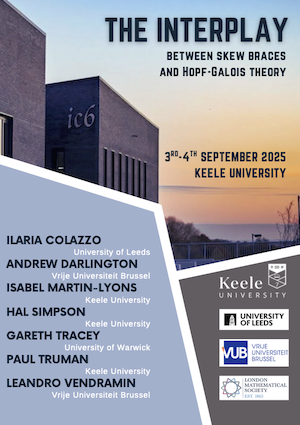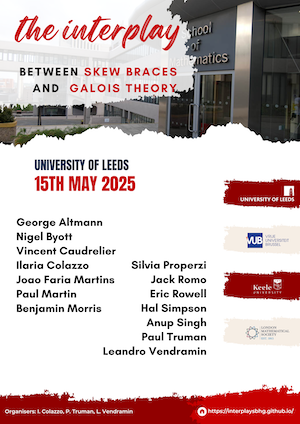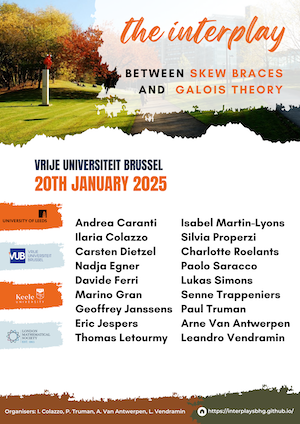Organisers
Ilaria Colazzo, I.Colazzo (at) leeds.ac.uk
University of Leeds (UK)
Paul Truman, p.j.truman (at) keele.ac.uk
Keele University (UK)
Leandro Vendramin, Leandro.Vendramin (at) vub.be
Vrije Universiteit Brussel (Belgium)
In 2016 a connection emerged between two apparently disparate topics: Hopf–Galois theory (whose applications include generalizations of the classical Galois correspondence and questions concerning the structure of rings of algebraic integers) and the theory of skew braces (intensively studied due to their connection with solutions of the Yang-Baxter equation, which appears in statistical mechanics, knot theory, …). This connection has already proven to be very fruitful, with numerous results concerning the existence, classification, and properties of objects being translated between topics, or developed in tandem.
The main aim of these meetings is to explore this interplay between skew braces and Hopf–Galois structures. Each side has its own concrete problems, with possible applications to understanding the mathematical structures belonging to the other side.
The Interplay Between Skew Braces and Hopf-Galois Theory
University of Keele: 3rd-4th September 2025
When: 3-4 September 2025
Where: University of Keele
Wednesday 3rd September
Andrew Darlington: Hopf-Galois theory and Cunningham chains (14:00)Gareth Tracey: On the Hasse-Norm Principle (15:00)
Tea(16:00)
Hal Simpson: Bicyclic biskew braces (16:30)
Thursday 4th September
Isabel Martin-Lyons: A review of the theory of skew bracoids (09:30)Coffee (10:30)
Paul Truman: Skew braces and abelian maps on groups of squarefree order (11:00) Abstracts
Participants
- Ilaria Colazzo (University of Leeds, UK)
- Andrew Darlington (Vrije Universiteit Brussel, Beligum)
- Isabel Martin-Lyons (University of Leeds, UK)
- Hal Simpson (University of Keele, UK)
- Gareth Tracey (University of Warwick, UK)
- Paul Truman (University of Keele, UK)
- Leandro Vendramin (Vrije Universiteit Brussel, Belgium)
University of Leeds: 15th May 2025
When: 15 May 2025
Where: Bragg Building, Room LT2.37, University of Leeds
15th May
Paul Truman: Biskew braces and abelian maps (09:30-10:30)Coffee break (10:30-11:00)
Vincent Caudrelier: Set-theoretical Yang-Baxter and reflection equations and soliton interactions (11:00-12.00)
Lunch (12:00-14:00)
George Altmann: A Higher Peripheral System for Welded Knots (14:00-14:30)
Jack Romo: Once-Extended Dijkgraaf-Witten Theories with General Homotopy Finite Target Spaces (14:30-15:00)
Coffee break (15:00-15:30)
Benjamin Morris: A Diagram Category for Non-orientable Surfaces (15:30-16:00)
Eric Rowell: Subobjects and Quotient Objects of Yang-Baxter Matrices (16:00-16:30) Abstracts
Participants
- George Altmann (University of Leeds, UK)
- Nigel Byott (University of Exeter, UK)
- Vincent Caudrelier (University of Leeds, UK)
- Ilaria Colazzo (University of Leeds, UK)
- Joao Faria Martins (University of Leeds, UK)
- Paul Martin (University of Leeds, UK)
- Benjamin Morris (University of Leeds, UK)
- Silvia Properzi (Vrije Universiteit Brussel, Belgium)
- Jack Romo (University of Leeds, UK)
- Eric Rowell (Texas A&M University, USA)
- Hal Simpson (University of Keele, UK)
- Anup Singh (University of Leeds, UK)
- Paul Truman (University of Keele, UK)
- Leandro Vendramin (Vrije Universiteit Brussel, Belgium)
Vrije Universiteit Brussel: 20th January 2025
When: 20 January 2025
Where: Vrije Universiteit Brussel
20th January
Andrea Caranti: Finite $p$-groups of class two with a large/small multiple holomorph joint work with Cindy (SIn Yi) Tsang (09:30-10:30)Coffee break (10:30-11:00)
Marino Gran: Semi-abelian categories, cocommutative Hopf algebras and Hopf braces (11:00-12.00)
Davide Ferri: Matched pairs and Yetter-Drinfeld braces (joint work with A. Sciandra) (12:00-12:30)
Lunch (12:30-14:00)
Paul Truman: Two sided bracoids, holomorphs, centralisers, and all that (14:30-15:30)
Coffee break (15:30-16:00)
Charlotte Roelants: Killing Forms on Finite Groups (16:00-16:30)
Paolo Saracco: Trusses, heaps of modules, and set-theoretic solutions to the Yang-Baxter equation (16:30-17:30)
Participants
- Andrea Caranti (Università of Trento, Italy)
- Ilaria Colazzo (University of Leeds, UK)
- Carsten Dietzel (University of Caen Normandy, France)
- Nadja Egner (Université catholique de Louvain, Belgium)
- Davide Ferri (Università di Torino, Italy and Vrije Universiteit Brussel, Belgium)
- Marino Gran (Université catholique de Louvain, Belgium)
- Geoffrey Janssens (Vrije Universiteit Brussel, Belgium)
- Eric Jespers (Vrije Universiteit Brussel, Belgium)
- Thomas Letourmy (Université libre de Bruxelles and Vrije Universiteit Brussel, Belgium)
- Isabel Martin-Lyons (University of Keele, UK)
- Silvia Properzi (Vrije Universiteit Brussel, Belgium)
- Charlotte Roelants (Vrije Universiteit Brussel, Belgium)
- Paolo Saracco (Université libre de Bruxelles, Belgium)
- Lukas Simons (Vrije Universiteit Brussel, Belgium)
- Senne Trappeniers (Vrije Universiteit Brussel, Belgium)
- Paul Truman (University of Keele, UK)
- Arne Van Antwerpen (University of Ghent, Belgium)
- Leandro Vendramin (Vrije Universiteit Brussel, Belgium)




